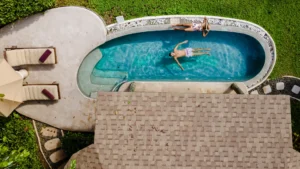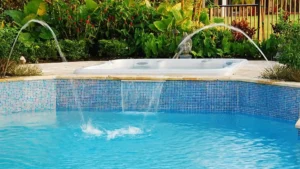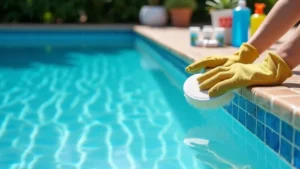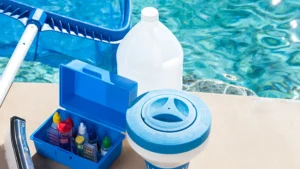
What to Do if Your Swimming Pool Is Losing Water
Is your swimming pool leaking? If you find yourself filling up the pool regularly, it may be an indication of a leak or other issue. In this article, we’re going to discuss reasons why a pool might be losing water, how to do pool leak detection, and when pool leak repair becomes necessary to fix the issue altogether.
Normal Causes of Water Loss from Pools
Swimming pools, under normal circumstances, drop about a quarter of an inch of water every day. That totals about two inches of water every week.
But in warm and humid regions, such as Florida, the water from pools evaporates a bit faster. It must also be noted that, in these areas, rain might weigh to some extent to the loss, thereby replenishing the pool walls.
Some factors greatly increase the loss of water in a pool.:
- Humidity: Levels of moisture in the air will have a distinct effect on how much water evaporates from the pool surface. In places with low humidity, water evaporates faster. Hence, when humidity is low, water loss is greater.
- Local climate: The general climate of the region where the pool is located plays a significant role in water loss. For example, in hot and dry climates, higher evaporation rates lead to greater water loss, whereas cooler and more humid areas typically experience less water loss
- Daily temperature range: The fluctuations in temperature during the day can also affect water loss.
Reasons for Fast Pool Leak Repairs

For that matter, when there is a leak in swimming pools, this is the time to have it done quickly. This is simply because one day the cost will be incurred for one inch of water lost in a pool, which, in turn, implies paying the operation, heating, and water rates to use the pool, not to mention the cost of repairing the infrastructure or other components that have been adversely affected by the leak.
Even the most minimal damage to a seal can led to leaking. Such cases are usually difficult to prevent; hence, your best option is to repair them quickly and efficiently.
How to Find Out if Your Pool Is Leaking
Detecting and repairing a leak should be left to a professional who can expertly diagnose the issue. If you have a suspicion that your swimming pool might be losing water, there is a straightforward test that you can easily conduct all by yourself, without the need to touch or manipulate any components of the pool itself.

To start this process, you will need
- Find a standard plastic container like a bucket.
- Fill the container with water from the pool.
- Place the container on one of the steps leading into the pool.
- Ensure that half of the container is above the water line and the other half is submerged in the pool of water.
Once you have positioned the container correctly, fill the remaining space in the container with water until the water level inside it is aligned with the surface level of the water in your pool.
After setting up the container, it is important to turn off any recirculating pump and disconnect any auto-refill devices that may be associated with your pool. This step is essential to ensure that no new water is added to the pool during your testing period.
Leave the container out in this position, uncovered, for a period of one to two days. After this time, return to check the water levels in both the pool and the container. You should take note of whether the water levels in both the container and the pool match each other, or if you observe a significant decrease in the water level of your pool in comparison to what is recorded in the container.
- This test is easy to perform
- It can help identify a leak in your pool. The method is straightforward and effective.
Get Swimming Pool Service from Amenity Pool Services
If your swimming pool needs leak detection or pool leak repair, get in touch with our team of experts at Amenity Pool Services today.
Our team can come to your pool to check and find the problem. For more information about our pool cleaning service or other available swimming pool services, give us a call.
FAQ's About Swimming Pool Water Loss
1. Why is my pool losing water?
All pools lose some water daily due to evaporation. Under normal conditions, expect about 1/4 inch per day, with weekly losses typically ranging up to 2 inches at most. However, factors like high temperatures, low humidity, wind, and pool activity can increase evaporation, leading to greater water loss.
2. How much pool water loss is normal?
A loss of 1/4 inch per day (or roughly 2 inches per week) is considered normal. If your pool is losing significantly more, it could indicate a leak rather than just evaporation.
3. What are the other causes of water loss in swimming pools apart from evaporation?
Besides the contribution of evaporating naturally, water is lost through leakages, cracks, worn seals, faulty plumbing fixtures, pool lights, and damage to liners. Splashing while in the pool and heater operation can also add to losses.
4. How can I determine whether my pool leaks?
One can do a bucket test. Fill a bucket with water and put it on the step of the pool. Mark the levels of water in it and the pool. After 1 to 2 days, compare the two. An indication that your pool is leaking is when the water level of the pool goes down by more than the water level in the bucket.
5. When should I be worried about losing water in my pool?
When you find that your pool loses 2 inches on average weekly, or if you notice a daily drop of 1 inch or more, then you should check for leaks and call a pool professional.
6. Do pool leaks lead to significant damage if they are left unrepaired?
Yes. Ignoring a leak will result in a higher water bill, more expensive cleanup, and potential landslide damage.






